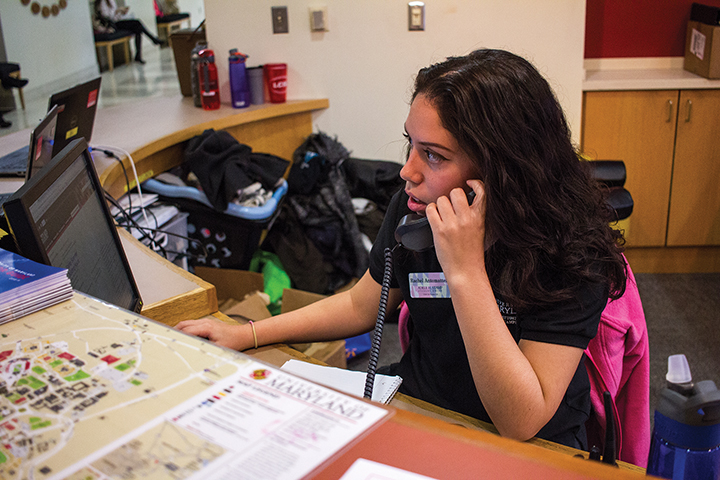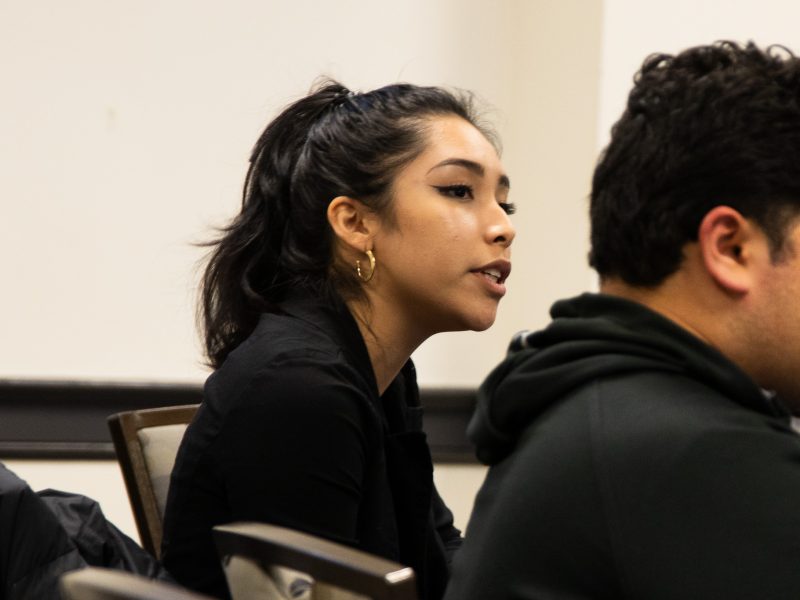“Hey, hey, ho, ho, low wages have got to go!” more than 50 students chanted from inside the University of Maryland’s Main Administration Building on Friday afternoon.
The group gathered in support of a student worker minimum-wage increase from $8.25 to Prince George’s County’s $9.55 while organizers from the Student Labor Action Project met with university President Wallace Loh to discuss the issue. However, the students did not get the support they wanted from Loh and administrators, said Sam Hajarian, a SLAP organizer.
“We did not win now,” the sophomore English major said when group members exited the meeting.
SLAP organizers did say they will team up with university officials to support a bill in the Maryland Senate that would raise the minimum wage across the state to $15 an hour by 2020.
“We were impressed with the students and their personal stories of working both on and off campus,” Loh wrote in an email. “We commended them on their activism and passion and assured them that the university supports their cause.”
Students working at this university make $8.25 an hour because it operates as a state-funded organization, even though the county has a mandated minimum wage of $9.55, effective as of October.
“What’s the deal with that? That’s not fair,” Hajarian said. “We live in P.G. County; we have expenses for living in P.G. County, but we’re being paid $8.25 — that’s ridiculous.”
Junior economics major Chris Bangert-Drowns, who is currently not enrolled in classes so he can save money, said he found this disparity unjust and proposed a bill in early February to the University Senate asking the governing body’s support of a wage increase for campus jobs. That bill will be reconsidered in March after the Senate Executive Committee decided on Feb. 19 to wait on SLAP’s meeting with Loh and more information on the state senate’s bill.
“The senate is the shared governance body that is overarching,” the SLAP organizer said. “We believe their support would be critical in trying to sway the administration. … But the power to change the minimum wage and how we implement minimum wage ultimately lies with President Loh.”
Members of Political Latinxs United for Movement and Action in Society, this university’s staff union, graduate students and a member of George Washington University’s Progressive Student Union showed their support of such a wage increase on Friday afternoon.
Doctoral candidate Dan Greene spoke to other students showing support for wage increases about student requests he’s received for extensions because coursework competes with jobs.
“My students’ working conditions are their learning conditions,” Greene said. “If I want them to have a good education and be part of this community, they cannot be busting their ass to be able to pay that tuition, housing costs.”
Sophomore sociology major Mandy Stussman is one of those students. She said she works for Dining Services and believes she and her fellow student workers deserve better wages.
“I feel like I’m constantly working, and then I get my paycheck and compare that to my tuition bill, and it’s astronomical, the difference,” Stussman said. “I’m sacrificing school for work, and I’m working to try to make my way through school, and I feel very trapped.”
This is more than an issue of economics, which is how it’s often framed, Bangert-Drowns said. It extends to the issue of academic accessibility.
“We’re not saying, ‘Follow the county arbitrarily,’ but we’re saying, ‘Hold yourself to a high standard; pay the higher of the two minimum wages,'” he said. “It makes sense logistically, ethically, and it makes sense from the standpoint of educational accessibility and affordability.”
Bangert-Drowns recalled the University of California system’s response to this issue as ideal; in October, the system launched a plan to increase minimum wages to $15 by 2017.
SLAP organizers’ plan to join the university in lobbying for a statewide minimum-wage increase is something Bangert-Drowns said is out of the organization’s comfort zone.
“Usually lobbying is administrative grounds,” he said. “We’re willing to step out of our comfort zone to do that; we’re only asking them to step out of their comfort zone as well. This is a serious issue.”
Junior history major and SLAP member Cory Johnson said he finds the university’s response to this issue contradictory.
“We’re at an institution that tries to promote itself as a place for social change,” Johnson said. “The only thing changing are the wages of the executives, the administration. Their paychecks go up and ours stay stagnant. That’s not OK.”




